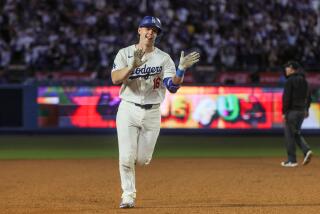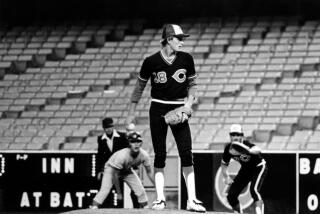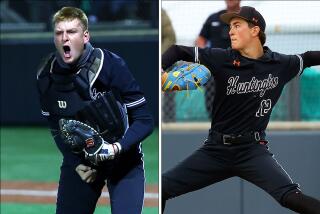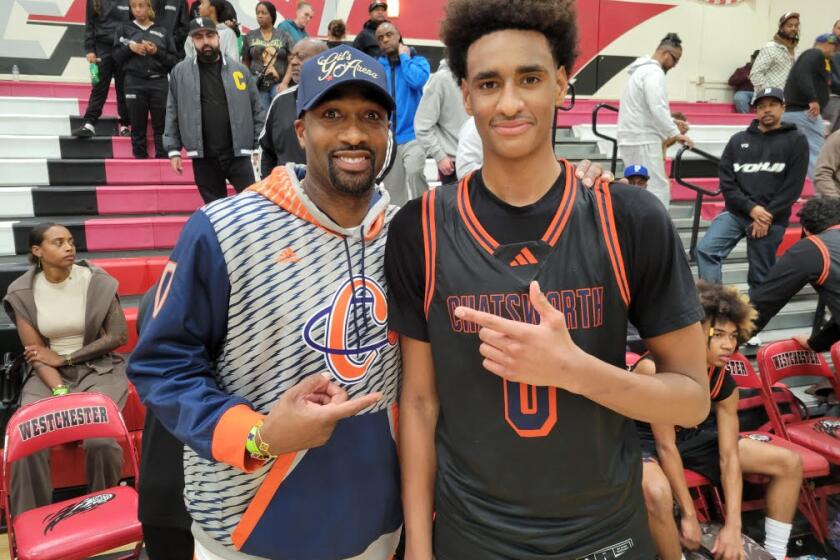Toro Golfers Have Extra Handicaps : Even So, Dominguez Pair Lead Their Team to National Ranking
Golf is a game of minute subtleties requiring exacting style that can be thrown off by minor distractions.
So Cal State Dominguez Hills’ national ranking among Division II golf teams--tops among West Coast schools--is amazing considering the setbacks suffered by the Toros’ leaders, Mack Smith and Pat Burke.
“I’ve been a football coach, and football players play with injuries. You expect it,” said Toros golf Coach John Johnson. “But it seems like any little thing throws off your golf game.”
Consider Pat Burke, the product of three generations of golf pros; he’s been having back spasms and hadn’t competed in a month when he played two rounds in the Southern California Intercollegiate Tournament last weekend at Torrey Pines and carded a 147 to lead Dominguez Hills to a sixth-place finish, best among Division II teams.
Playing in Pain
And consider Mack Smith, a gutsy senior who nearly severed two fingers in an accident less than a year ago and is an All-American candidate despite continuing pain and loss of feeling in the hand and fingers. He shot 149 last weekend, disappointing by his standards.
“It’s really amazing what he’s been able to do,” said Johnson, calling Smith “the most consistent golfer in the school’s history.”
The two will be on display this weekend in Galt where the Toros will be trying to win the first-ever Division II West Coast Regional Championship and advance to the national tournament in Houston. Also on the team are Mike Strlekar, Mel Hawkins, Charlie Worrilow and Scott Wally.
Smith, a 23-year-old out of Los Altos High School who harbors thoughts of a pro career despite his injury, was fishing with friends last June in Mexico and was filleting a catch when he ripped into the ring and pinkie fingers where they meet the palm of his left hand. He cut most of the tendons in the fingers and did nerve damage that left much of his hand without feeling. He got a few emergency stitches in Mexico, then returned to California for an operation that involved moving a tendon from his wrist into his pinkie.
‘Wasn’t Looking Good’
At that point it wasn’t a question of golfing again but of saving the fingers. “It wasn’t looking good,” Smith said.
Given the choice of surgery that would leave his fingers straight and unbendable or permanently curled, Smith chose the latter (earning the nickname “Captain Hook” from teammates in typical locker-room humor). He can’t straighten the two fingers or get much strength, and the transplanted tendon in his palm stands out grotesquely--he’ll probably need follow-up surgery--but Smith can grip a club and has made the best of it.
“I was out of golf five months. My arm was in a cast for 3 1/2. It’s getting better and better but it still hurts a lot. When I get out there I take the attitude I’m just lucky I’m playing. I think that attitude has helped--I’m so relaxed.”
Indeed, though Smith says he hasn’t played his best golf since he left Mt. San Antonio College two years ago, he shot a 67 in his fourth round back after the injury and has been playing consistently. He barely missed qualifying for the national tournament last year when he averaged 76.89 strokes, and early this season he was averaging 73.94.
Handicapped but Cheerful
“I’m happy to the extent I can hold a club and swing. Considering (the injury), I’m having a pretty good year. But I think I’ll keep improving. My right grip is a lot stronger, the left is a lot weaker. It took a long time to get the feel. I spent a lot of hours at the range. . . . I seemed to get pretty consistent. I have no feeling in the side of the fingers--that affects my touch on putting. But I have been putting pretty well. I’ve been driving pretty straight.”
While Smith has been learning to reuse his hand, Burke has been frustrated by inaction after getting off to a fast start, winning several early tournaments.
When there’s a problem with his game, the 23-year-old Burke can usually pick up the phone and dial home, where golf is all in the family. His father, Mike, and mother, Joan Martin (his parents are divorced), are golf pros; his brother, Mike, was on the tour for a year, and his grandfather is from a well-known golfing family.
Works at Golf Course
“Anytime there’s a problem I can get help,” Burke said. But lately he has needed a chiropractor instead of a golf pro. Burke said the strength of his game is probably his long driving, which was affected most by his back problems. But his comeback last weekend was encouraging to the team.
Not that he was ever very far from the game. Burke, a sophomore, is assistant superintendent at Friendly Hills Golf Course where he puts in 30 to 40 hours a week. Smith, a member there, was Burke’s contact at Dominguez Hills.
Both took similar, roundabout paths to the Carson school.
Smith, slender and with fine, dark features, starred in several sports at Los Altos High and kicked for the junior varsity football team at Brigham Young University before deciding golf was his game. He transferred to Mt. SAC and hoped to continue on to UCLA. That didn’t work out, so he ended up at Dominguez Hills where he is working on a sociology degree and has helped the Toros earn prestige in golfing circles.
Burke, stockier than his partner, played ice hockey in high school in New Jersey--”That’s what I actually wanted to do out of high school”--but suffered a head injury and was advised to stick with golf. He went to a junior college in Florida and hoped to hook on with a Division I power, but because of eligibility rules and the necessity of holding a job, Burke found that Dominguez Hills fit his needs. He’s working on a degree in hotel management.
Though both would like to make the pro tour, neither is counting on it. Smith said, “I hope to go to Florida, play the mini-tour, get some experience, maybe get a tour card. The whole time I’ve been thinking about the pros, but since I did this (hand injury) I’ll just let the whole thing ride, see what happens, see how the hand feels.”
Burke, who said his mother was the first New Jersey woman in the Professional Golfers Assn., said working as a course pro “is not that great a living” and he is more interested in something with more range such as course management for a resort.
“In high school I was going to go on tour like my brother,” he said. “But I watched him and he didn’t really make expenses, and he cleans my clock constantly. So I decided to go to school looking at a degree.”
And he hasn’t forgotten about hockey. He’s hoping to get back into an amateur league and work off some frustration.
More to Read
Get our high school sports newsletter
Prep Rally is devoted to the SoCal high school sports experience, bringing you scores, stories and a behind-the-scenes look at what makes prep sports so popular.
You may occasionally receive promotional content from the Los Angeles Times.






